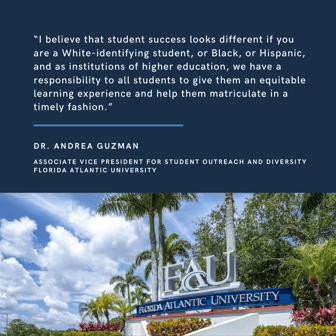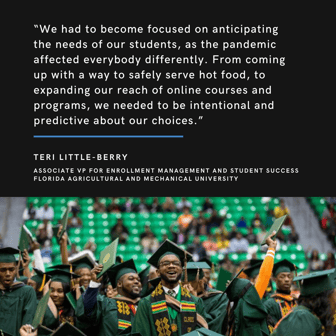The Road Ahead: Turning a Crisis into a Catalyst for Transformative Change
The COVID-19 pandemic has led institutions of higher education across the nation to reconsider initiatives and rethink strategies to more effectively support student success. On June 17th, 2021, Mentor Collective hosted a virtual roundtable discussion with leaders from Florida institutions to understand how they stand ready to help institutions and students thrive.
Here are a few of the key takeaways from the event.
Know your student.
 From mentorship to advising, institutions must be adaptable for the current time and tailored for the unique populations they serve; one-size-fits-all approaches just don’t cut it anymore.
From mentorship to advising, institutions must be adaptable for the current time and tailored for the unique populations they serve; one-size-fits-all approaches just don’t cut it anymore.
“I believe that student success looks different if you are a White-identifying student, or Black, or Hispanic, and as institutions of higher education, we have a responsibility to all students to give them an equitable learning experience and help them matriculate in a timely fashion,” said Dr. Andrea Guzman, associate vice president for student outreach and diversity at Florida Atlantic University.
Listen to what your students are saying.
Panelists spoke of how they have been proactively using student feedback to address significant challenges of the COVID-19 pandemic.
“It starts with relationships,” said Dr. Christopher W. Blakely, assistant vice president of campus life and dean of students at Florida Gulf Coast University. “My saying is ‘Don’t make policies about them without them.’ At FGCU, we’ve created a variety of feedback mechanisms to hear those student voices—including anonymous, verbal, written, and social media—to make sure we’re hearing from lots of different groups.”
FGCU also uses small focus groups, a Dean’s Advisory Council, and group counseling sessions to give many students the opportunity to share what they need in the moment.
Understand your environment.
 Panelists offered up some lessons they’ve learned over the last 18 months, and many of them had to do with better understanding contextual challenges faced by students, from an unfamiliarity with online technology to difficulty in obtaining basic human necessities.
Panelists offered up some lessons they’ve learned over the last 18 months, and many of them had to do with better understanding contextual challenges faced by students, from an unfamiliarity with online technology to difficulty in obtaining basic human necessities.
“We didn’t have many classes online prior to the pandemic and some people had no experience at all with remote learning or instruction, so there was a learning curve for everyone—faculty, staff, and students,” said Dr. Guzman. “We found we had to continuously and consistently assess the skill level of faculty and staff and the needs of our students as life with the pandemic changed.”
“We had to become focused on anticipating the needs of our students, as the pandemic affected everybody differently,” said Teri Little-Berry, associate vice president for enrollment management and student success at Florida Agricultural and Mechanical University. “From coming up with a way to safely serve hot food, to expanding our reach of online courses and programs, we needed to be intentional and predictive about our choices.”
The full recording of the roundtable discussion is available here. To start a conversation about how to utilize mentorship to engage and support your students, contact Mentor Collective today.